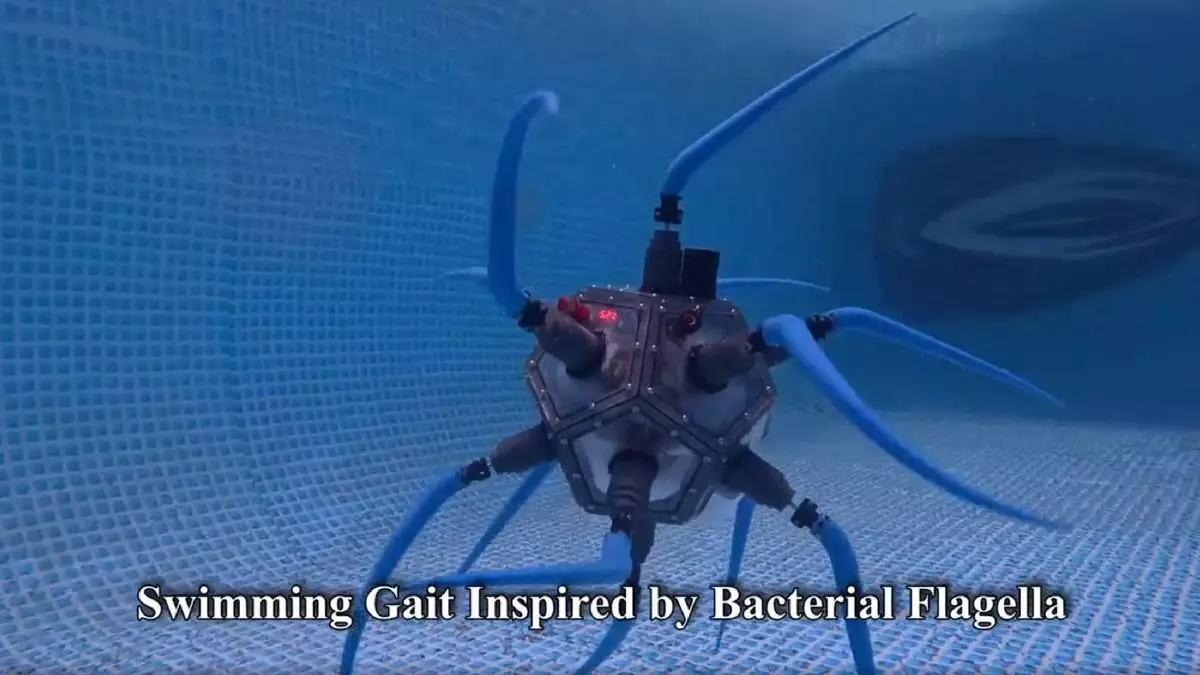In the pantheon of technology, we often find that nature serves as the best teacher. The newly developed ZodiAq underwater drone exemplifies this principle, as its design is inspired by soft-bodied marine creatures that navigate through water with grace and ease. Unlike rigid, traditional robotic counterparts, ZodiAq boasts a set of twelve flagella-like limbs that emulate the fluid movements of cephalopods, allowing it to glide seamlessly through aquatic environments. This drone doesn’t just fulfill the role of a mere surveillance tool; it represents a paradigm shift in robotics and environmental monitoring.
The ZodiAq swims with an elegance that sets it apart from conventional drones. As our oceans face unprecedented challenges, from pollution to climate change, innovative creations like the ZodiAq assert themselves as vital instruments that promise to transform our approach to marine research. Equipped with cutting-edge technologies, it deftly maneuvers across the seafloor, with minimal disruption to its surroundings. In a world where understanding marine ecosystems is critical, ZodiAq emerges as a promising ally, ready to chart new territories.
Soft Robotics: Embracing Nature’s Design
What makes ZodiAq remarkable is its embrace of a ‘soft’ robotics framework, diverging from traditional hard-structured designs that often struggle to operate effectively in delicate environments. The tentacular configuration and movement mechanism of ZodiAq stem from the realization that softer materials can lead to increased versatility and functionality. Instead of crashing through the depths with rigid components that can create chaos in sensitive ecosystems, ZodiAq glides gracefully, mimicking the very organisms it seeks to study.
This soft-bodied approach is rooted in nature’s time-tested designs, where flexibility often equates to survival. For example, octopuses and jellyfish utilize their soft bodies to navigate through habitats that would otherwise be restrictive for harder-bodied creatures. By synthesizing these biological principles into robotic functionality, the ZodiAq sets a precedent for future innovations aimed at minimizing ecological impact while maximizing operational efficiency.
The Technology Behind the Magic
At the heart of the ZodiAq’s design lies a sophisticated network of sensors and actuators. Each limb functions independently, powered by individual motors and directed by an onboard Raspberry Pi. This allows for intricate movement patterns not usually associated with typical drones. Importantly, the redundancy built into its structure serves as a safety net in the event of a motor failure, ensuring that ZodiAq can navigate back to safety even if several limbs become incapacitated—a crucial feature for deep-sea exploration where reliability is paramount.
Moreover, the ballast system within the drone dynamically adjusts its center of gravity to maintain stability and depth control. Coupled with onboard cameras and motion sensors, ZodiAq exhibits a remarkable ability to engage with its environment while avoiding obstacles. The comprehensive design and thoughtfulness of its engineering elevate the drone beyond a mere gadget; it is an intricate tool designed for nuanced interaction with the ocean’s depths.
The Future of Exploration
As inspiring as the ZodiAq may be, it is essential to view this innovation as part of a broader movement within technological and environmental disciplines. The fascination with soft robotics is sweeping across academic and research circles, encouraging fresh perspectives on how machines can interact with the world. The ingenuity of the ZodiAq highlights an exciting future where technology is not just an extension of human capability but rather a partner in exploring and preserving the ecosystem.
While the ZodiAq may evoke memories of adventurous gaming moments—those harrowing depths where players face unknown threats in games like Subnautica—it also stirs a passionate discourse on the importance of accessibility, ethics, and responsibility when it comes to technological advancements. As we push the boundaries of exploration, we must ensure that tools like the ZodiAq prioritize ecological conservation and the dissemination of knowledge.
In essence, the emergence of soft robotics might well be the harbinger of a new era in exploration, one that respects the natural world while unlocking its secrets. The ZodiAq is not merely about swaying gracefully through the depths; it is about integrating technology into our eco-centric view of the world—a profound transition that has the potential to redefine how we understand and interact with our blue planet.

